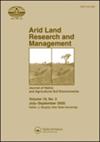Diversity of Arbuscular Mycorrhizal Fungi in olive orchard soils in arid regions of Southern Tunisia
IF 1.9
4区 农林科学
Q3 ENVIRONMENTAL SCIENCES
引用次数: 3
Abstract
Abstract Arbuscular Mycorrhizal Fungi (AMF) play a fundamental role in the development and survival of plant species in arid regions. The objectives of the present research were (1) to characterize the native AMF communities in olive orchard soils collected from arid regions of southern Tunisia and (2) to study the AMF-host specificity hypothesis. AMF spores were extracted from soil-root samples collected from orchards planted with two indigenous olive cultivars (Chemlali and Zarrazi) and located at three sites (Matmata, Zarzis and Tataouine) along an aridity gradient. First, the abundance of AMF spores was determined; then the AMF spores were grouped into several morpho-types and molecularly characterized by 18S rDNA nested-PCR approach. AMF abundance and diversity varied among cultivars and sites. Olive orchard soil of Zarzis site had the highest spore density (140 spores/100g soil), while the Tataouine site had the lowest density (100 spore/100 g soil). Pooled data of morpho-typing and sequence-driven analyses allowed the identification of 10 AMF taxa with the dominance of Glomeraceae family, represented by Glomus, Rhizophagus and Funneliformis genera, followed by Diversisporaceae family. The less arid site (Matmata) exhibited the highest AMF diversity, while the most arid-site (Tataouine) showed the lowest one. The cultivar Zarrazi displayed a higher ability to associate with AMF than Chemlali. For all analyzed sequences, five AMF taxa were associated with Chemlali and eight were associated with Zarrazi.突尼斯南部干旱地区橄榄园土壤丛枝菌根真菌的多样性
丛枝菌根真菌(AMF)在干旱区植物的发育和生存中起着至关重要的作用。本研究的目的是:(1)表征从突尼斯南部干旱地区收集的橄榄园土壤中的原生AMF群落;(2)研究AMF宿主特异性假设。AMF孢子从种植两种本地橄榄品种(Chemlali和Zarrazi)的果园土壤根系样品中提取,并沿干旱梯度分布在3个地点(Matmata、Zarzis和Tataouine)。首先,确定AMF孢子的丰度;利用18S rDNA巢式pcr方法对AMF孢子进行了分子鉴定。AMF丰度和多样性在不同的品种和地点之间存在差异。Zarzis场地橄榄园土壤孢子密度最高,为140个孢子/100g土壤,而Tataouine场地孢子密度最低,为100个孢子/100g土壤。通过形态学分型和序列驱动分析,鉴定出10个AMF类群,其中以Glomus、Rhizophagus和funeliformis属为代表的Glomeraceae科占优势,其次为Diversisporaceae科。干旱程度较轻的样地(Matmata)的AMF多样性最高,而最干旱的样地(Tataouine)的AMF多样性最低。品种Zarrazi对AMF的亲和性高于Chemlali。在所有分析序列中,5个AMF分类群与Chemlali相关,8个与Zarrazi相关。
本文章由计算机程序翻译,如有差异,请以英文原文为准。
求助全文
约1分钟内获得全文
求助全文
来源期刊

Arid Land Research and Management
环境科学-环境科学
CiteScore
3.80
自引率
7.10%
发文量
23
审稿时长
9 months
期刊介绍:
Arid Land Research and Management, a cooperating journal of the International Union of Soil Sciences , is a common outlet and a valuable source of information for fundamental and applied research on soils affected by aridity. This journal covers land ecology, including flora and fauna, as well as soil chemistry, biology, physics, and other edaphic aspects. The journal emphasizes recovery of degraded lands and practical, appropriate uses of soils. Reports of biotechnological applications to land use and recovery are included. Full papers and short notes, as well as review articles and book and meeting reviews are published.
 求助内容:
求助内容: 应助结果提醒方式:
应助结果提醒方式:


